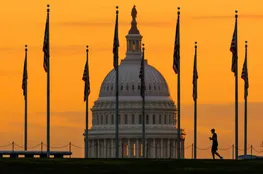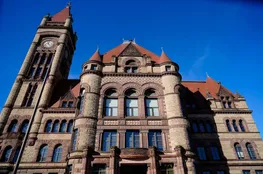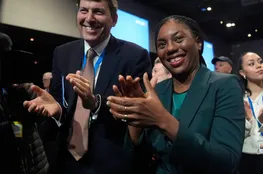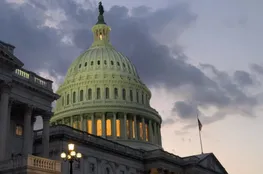US House works all night as Trump’s budget bill still on hold US President Donald Trump’s allies in Congress have continued attempts to pass a comprehensive tax and spending bill, holding talks through Tuesday night to try to quell Republican dissent. The bill includes several of Trump’s top priorities: extending tax cuts first passed in 2017, eliminating taxes on tips and overtime wages, additional spending on defence and border security, and cuts to government healthcare programmes. But the bill has been stalled by hard-line Republicans who want deeper spending cuts. Meanwhile, others in the party want deeper tax cuts. The Congressional Budget Office (CBO) estimates the bill would add about $2.3tn (£1.7tn) to the US national debt over the next 10 years. Trump campaigned on promises to reduce the US budget deficit - meaning the annual gap between the government’s tax revenue and its expenditure - which currently stands at around $36.2tn (£27tn).
Negotiators worked through the night, including a meeting of a House committee which began at 01:00 local time (05:00 GMT) Wednesday. The president has called his proposal a "big, beautiful, bill" – the measure is now officially known as the "One Big Beautiful Bill Act" – but has faced opposition from members of the hard-right House Freedom Caucus who want additional spending cuts. At the same time, several Republicans representing districts in Democratic-leaning states want bigger tax cuts for their voters - which could be achieved by increasing the credits those voters receive for paying state taxes at relatively high rates. Trump and his congressional allies are trying to please both dissenting factions, which could be an extremely difficult task. After reports that a deal had been reached to increase tax cuts, Republican Congressman Andy Harris of Maryland, chair of the hard-line House Freedom Caucus, told Newsmax: "I think actually we're further away from a deal". "The conservatives are pushing for some balancing spending reductions" to offset tax cuts, he said. Trump visited Congress on Tuesday, where he met with Republicans and urged both the budget hawks and tax-cut proponents to accept the bill on the table. It was unclear whether the president managed to swing many votes, but the bill’s supporters remained bullish about its eventual prospects. "Failure is not an option in getting this done," said Republican Jason Smith of Missouri. The White House has dismissed worries about the ballooning US debt, arguing that tax cuts will stimulate the economy, while his separate programme of tariffs will bring additional revenue to the federal government. However, most economists and experts agree with the non-partisan CBO that the bill will add to the debt.
Democrats are opposed to the bill, saying it will benefit the rich and unfairly punish lower-income Americans, particularly through the healthcare cuts. A separate CBO analysis reported that the bill would hurt the poorest Americans while benefiting the top 10% of earners. "We're going to ask Americans to finance tax cuts for billionaires on the national debt - on the credit card," said Democratic Representative Gwen Moore of Wisconsin. The tight margin between the parties in the House means Trump and his allies need near-unanimous support from Republicans to pass the measure. House Speaker Mike Johnson has said he wants the bill passed by Monday 26 May, the Memorial Day holiday in the US. Although it is possible the bill could come up in the full House on Wednesday or Thursday, it is unlikely that the Speaker will risk a vote unless he is confident that the measure will pass. Even if the bill passes the House, it is a long way from becoming law. The legislation would move to the Senate - and then be subjected to a likely negotiation process to reconcile two versions of the bill - before it can be sent to the president for his signature."
























